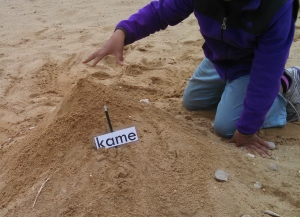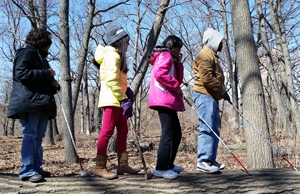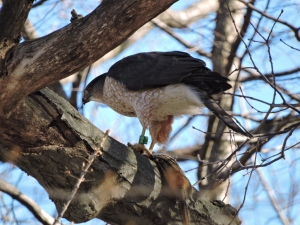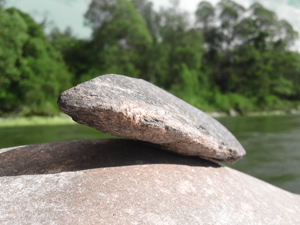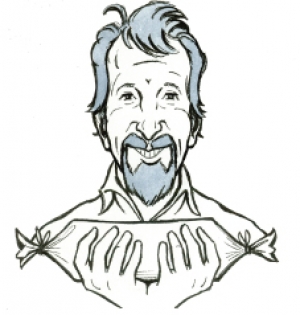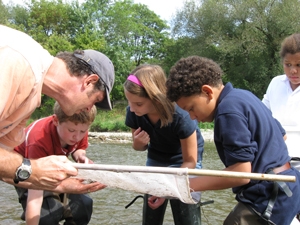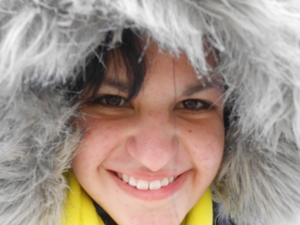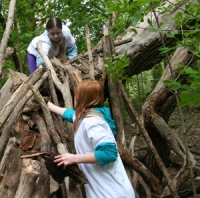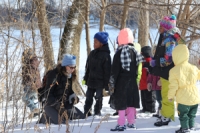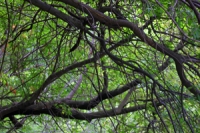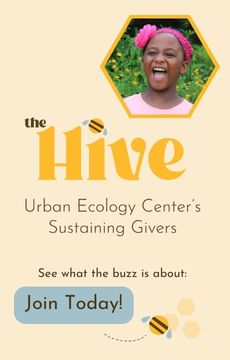
Lake Michigan Lessons
One of my favorite places to take school groups is Lake Michigan. It is such a valuable resource right in the backyard of our city. We use it in many ways to teach lessons to students. One lesson is that our drinking water comes from Lake Michigan. Another is the rock cycle, during which we collect different rocks at the “skipping stone beach.” Recently, my co-teacher Tory and I used the beach to teach 4th graders about glaciers and glacial landforms.
“Seeing” Nature
I was asked recently, “What is your philosophy of education?” This is a question I’ve explored many times throughout my years as an educator. Depending on the crowd, my answer brought warm smiles or a furrowed brow as some consider my philosophy a bit “dreamy” in this data-driven, standards-based era of education.
To me, a meaningful education is a journey of discovery, exploring the mystery and the magic of the world around us and within us. I had the joy of witnessing this outward and inward journey recently while observing two of our talented environmental educators in action.
A Hawk, a Chipmunk and So Much More
“Look! Up there, high in the tree, perched on that branch,” an environmental educator directed his class of students to where a Cooper’s Hawk sat in a tree in Riverside Park.
Just moments before they spotted the hawk, a chipmunk had darted across the path in front of them. Out hunting for signs of spring, the class was thrilled at the sighting because chipmunks are hibernators and only awaken from their deep slumber when the weather warms just enough – a true sign of spring!
Not Just A Rock
The morning sunlight shimmered on the rippling surface of the river. It was a beautiful day in late fall as second graders hiked along the Menomonee Valley trails. The excitement of the kids grew as the trail got more and more covered by the trees. I realized that the border between them and the natural world had started to break down when I heard a few “wows” for a Blue Heron that flew by and a salmon going up the river to spawn. You could sense the connection one student had as she held an improvised walking stick.
The Greatest Gift
Hi, it’s me, Ken! I’m thinking about what to give to the special people in my life during this giving season. Should I give them an Urban Ecology Center gift membership? A Center t-shirt? Or maybe a day outdoors in the snow? Hmm, perhaps I should ask around. "What does the fox say?"
From Fear to Understanding
I love fall! We begin a new school year with excited students, perfect sunny days and beautiful changing leaves. Fall is also when I get to teach a class that brings kids into the water to look for macroinvertebrates. It’s one of my favorite classes to teach.
The program begins with the students tucking in their shirts and climbing into waders to explore the Milwaukee River. We hand them kick nets and bins to hold the benthic invertebrates they find. As we head to the river, there is nervous excitement. It is fun to watch the first groups get their bearings in the water.
A School Year of Firsts
“Miss Katie, I love nature!” “Nature is the best!” I absolutely love hearing these exclamations as students dance on Washington Park’s Band Shell, climb fallen trees or dip nets into the lagoon. As my first year of teaching students in our school program comes to an end, I begin to reflect on everything I have learned during this year.
Build It!
“Get out your hard hat! It’s time to put some materials to the test. Stretch’em, soak’em, crush’em – use what you learned to construct something (a bridge, a bird nest or a building) to solve a problem.”
This is the description for one of our school programs for second graders. We use the Three Little Pigs story as a reference. Students get to know about the properties of certain materials, then they are divided into groups to build up sturdy enough structures out of cups so as to withstand the wolves’ huffs and puffs.
Rivers of Fun
Spring is always a time of excitement and of release. As the snow melts and the birds return, I feel a sense of relief from the cooped-up restlessness of winter. The students I work with seem to have the same experience, though of course in a more exaggerated way. After a winter in often windowless classrooms, they are as wiggly physically as I am mentally.
The typical structure of our classes with the Neighborhood Environmental Education Project, our school program, is to do one or two short activities inside before heading out into the park.
The “Heartbeat” of a Community
It was another sunny day in the Menomonee Valley. Delma placed the stethoscope against a gnarly tree branch in Three Bridges Park. Her eyes grew wide and she shouted “I can hear it! The tree has a pulse!”
Several minutes, and several tree pulses later, Delma approached me and said, “My grandfather in Mexico used to place his ear to the ground and say he could hear the heartbeat of the earth. Is it true that the earth has a heartbeat? Now that I’ve heard the pulses of the trees I think he is right.” It was one of the most profound and beautiful statements I have ever heard, and it came from a seventh grader.
Copyright © 2023 The Urban Ecology Center

